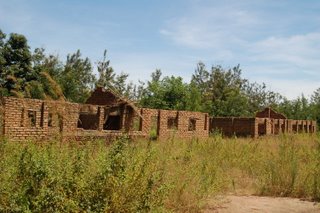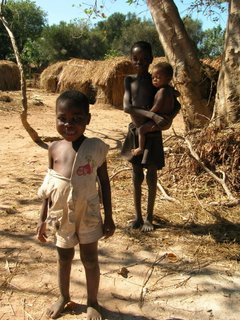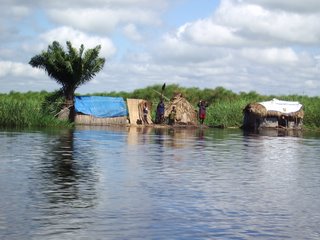Points on a crisis
I returned from the field yesterday (an aside- most people would consider any place in Congo “the field,” but those of us here tend to use it to mean places outside of where we live, usually involving Landcruisers, motorcycles, trees fallen and blocking roads, and broken bridges. This recent trip was no exception).
I wish I could lay it all out, this mess that is Katanga. I don’t think the space here allows for that, and the slow internet at the Catholic mission where I am shacked up in Lubumbashi makes posting links a particularly lengthy endeavor. My last post touched on it, that the plots and characters of this crisis is intrinsically linked to the two wars that rocked Congo between 1998-2003, but also to other political problems, and a troubled history for this mineral rich province that dates back decades. So the information that I give will always be incomplete.
Katanga is in the southeast corner of the Democratic Republic of Congo. It shares its borders with three countries: Tanzania, Zambia and Angola. When Rwanda invaded Congo five years ago (ironically to try to take down a leader that they themselves had installed), local resistance movements known as “Mai-Mai” formed to fight the foreign invaders. It is difficult to describe the Mai-Mai as they were not a cohesive movement – Mai-Mai in one province had pretty much nothing to do with Mai-Mai in another one. In fact, the war in Congo often involved the splintering of armed movements on both sides into smaller and smaller factions, but the Mai-Mai were not really that together to begin with. The government in Kinshasa supported the Mai-Mai in Katanga with weapons, since they were fighting the Rwandans. After the peace agreement was signed, the Mai-Mai here were still around, and they did not just give up the power that had come with their guns. Katanga has gold and mineral wealth worth fighting for, even if this means just taking control of a few mines, rather than going for the whole thing. An understood truce between the Congolese army and the Mai-Mai fell apart in March of last year, supposedly after the army did not bring drinks to a meeting between the two groups. Once they turned on each other, the Mai-Mai began escalating raids and attacks onto civilians. The areas that I visited had 40,000 displaced people living there (they are not technically “refugees” as they have not crossed the border into another country, so they are called “internally displaced persons”). Imagine driving 150 miles of dirt roads dotted with small villages, with 8,000 families setting up huts among the houses of the locals, who do not have much themselves. These families brought nothing with them and are living primarily off cassava – a starchy root vegetable like a potato, with leaves that can be cooked like spinach. They are sharing locally forged pots between several families, who use the same ones for gather water and for cooking. Malnutrition rates are very high, which are contributing to high mortality rates. This particularly hits children under five.
They have received no humanitarian assistance.

This is a school house that was burnt by the Mai-Mai in February. The village fled, and some are starting to come back to rebuild their lives. The rest of the village looks no better than this building.
To make things worse, the Congolese army is patrolling the area. In a way this is good – it has provided security for the population by preventing the Mai-Mai from attacking villages. But the army is also forcing people to act as porters and sexually exploiting women and girls. They force the local population to give them food, since they rarely receive their salaries. I also heard cases of false arrests, rape, kidnapping and murder.
I saw the infamous Mai-Mai. A group of 400 people had come out of the jungle to turn themselves in a few days before we got there. Trapped in the jungle, cut off from their raiding, they were starving. They were not just men, but entire families of women and children (many of the women had been forced to come with them over the years after raids on their villages). Most had come out of the jungle completely naked. Locals had given some clothing along the way (to this group, that had been their enemy? This group that has raped, burned, killed and supposedly cannibalized? I will never understand Congo). They seemed powerless and ragged.

Mai-Mai children, cheerful but very malnourished. Their joints are swollen from having walked miles every day - the group was always on the move. In the last few months they have been living off raw mushrooms and whatever they can find in the jungle. Now the women and children are living in a camp under military "protection," while the men are being taken to another location. The huts in the background are typical shelters in their camp.
When I got back to the town of Malemba Nkulu after six days of driving through the jungle and savannah terrain, I was exhausted and wired. To here these stories, to see bullet casings on the ground, burnt out homes and destroyed schools…cracks appeared the wall that I place between myself and the troubles here. I was excited about being a catalyst to get assistance in, but so angry too, at the needless suffering, at the fact that assistance is so late…at many things.

With the Mai-Mai attacking from the East and North and the army moving in, more than 5,000 families fled to floating islands on Lake Upemba. They built shelters on reeds, and if you stood on that shore, you would sink up to your shins. They drink from the lake and also use it as their toilette, so the sanitation needs are high. this photo was taken by a colleague from another organization, the area was just south of where we did our mission. The majority of households have received non-food item assistance (plastic sheeting, pots and pans, blankets) from Medicins Sans Frontieres, who really have their act together.
The Mai-Mai are withered in strength, the army does not harass humanitarians, and it’s not like you see people firing weapons at each other. The kids, even with bloated bellies from malnutrition, smile at me, make silly poses for the camera, and follow me around. When I talk with families who have been displaced five times in the last four years, there is a strange acceptance of their fate. Yet this is a humanitarian crises, even if the body count is hidden (people are dying from malnutrition, malaria and respitory infections). Like I said, I will never understand Congo.
I wish I could lay it all out, this mess that is Katanga. I don’t think the space here allows for that, and the slow internet at the Catholic mission where I am shacked up in Lubumbashi makes posting links a particularly lengthy endeavor. My last post touched on it, that the plots and characters of this crisis is intrinsically linked to the two wars that rocked Congo between 1998-2003, but also to other political problems, and a troubled history for this mineral rich province that dates back decades. So the information that I give will always be incomplete.
Katanga is in the southeast corner of the Democratic Republic of Congo. It shares its borders with three countries: Tanzania, Zambia and Angola. When Rwanda invaded Congo five years ago (ironically to try to take down a leader that they themselves had installed), local resistance movements known as “Mai-Mai” formed to fight the foreign invaders. It is difficult to describe the Mai-Mai as they were not a cohesive movement – Mai-Mai in one province had pretty much nothing to do with Mai-Mai in another one. In fact, the war in Congo often involved the splintering of armed movements on both sides into smaller and smaller factions, but the Mai-Mai were not really that together to begin with. The government in Kinshasa supported the Mai-Mai in Katanga with weapons, since they were fighting the Rwandans. After the peace agreement was signed, the Mai-Mai here were still around, and they did not just give up the power that had come with their guns. Katanga has gold and mineral wealth worth fighting for, even if this means just taking control of a few mines, rather than going for the whole thing. An understood truce between the Congolese army and the Mai-Mai fell apart in March of last year, supposedly after the army did not bring drinks to a meeting between the two groups. Once they turned on each other, the Mai-Mai began escalating raids and attacks onto civilians. The areas that I visited had 40,000 displaced people living there (they are not technically “refugees” as they have not crossed the border into another country, so they are called “internally displaced persons”). Imagine driving 150 miles of dirt roads dotted with small villages, with 8,000 families setting up huts among the houses of the locals, who do not have much themselves. These families brought nothing with them and are living primarily off cassava – a starchy root vegetable like a potato, with leaves that can be cooked like spinach. They are sharing locally forged pots between several families, who use the same ones for gather water and for cooking. Malnutrition rates are very high, which are contributing to high mortality rates. This particularly hits children under five.
They have received no humanitarian assistance.

This is a school house that was burnt by the Mai-Mai in February. The village fled, and some are starting to come back to rebuild their lives. The rest of the village looks no better than this building.
To make things worse, the Congolese army is patrolling the area. In a way this is good – it has provided security for the population by preventing the Mai-Mai from attacking villages. But the army is also forcing people to act as porters and sexually exploiting women and girls. They force the local population to give them food, since they rarely receive their salaries. I also heard cases of false arrests, rape, kidnapping and murder.
I saw the infamous Mai-Mai. A group of 400 people had come out of the jungle to turn themselves in a few days before we got there. Trapped in the jungle, cut off from their raiding, they were starving. They were not just men, but entire families of women and children (many of the women had been forced to come with them over the years after raids on their villages). Most had come out of the jungle completely naked. Locals had given some clothing along the way (to this group, that had been their enemy? This group that has raped, burned, killed and supposedly cannibalized? I will never understand Congo). They seemed powerless and ragged.

Mai-Mai children, cheerful but very malnourished. Their joints are swollen from having walked miles every day - the group was always on the move. In the last few months they have been living off raw mushrooms and whatever they can find in the jungle. Now the women and children are living in a camp under military "protection," while the men are being taken to another location. The huts in the background are typical shelters in their camp.
When I got back to the town of Malemba Nkulu after six days of driving through the jungle and savannah terrain, I was exhausted and wired. To here these stories, to see bullet casings on the ground, burnt out homes and destroyed schools…cracks appeared the wall that I place between myself and the troubles here. I was excited about being a catalyst to get assistance in, but so angry too, at the needless suffering, at the fact that assistance is so late…at many things.

With the Mai-Mai attacking from the East and North and the army moving in, more than 5,000 families fled to floating islands on Lake Upemba. They built shelters on reeds, and if you stood on that shore, you would sink up to your shins. They drink from the lake and also use it as their toilette, so the sanitation needs are high. this photo was taken by a colleague from another organization, the area was just south of where we did our mission. The majority of households have received non-food item assistance (plastic sheeting, pots and pans, blankets) from Medicins Sans Frontieres, who really have their act together.
The Mai-Mai are withered in strength, the army does not harass humanitarians, and it’s not like you see people firing weapons at each other. The kids, even with bloated bellies from malnutrition, smile at me, make silly poses for the camera, and follow me around. When I talk with families who have been displaced five times in the last four years, there is a strange acceptance of their fate. Yet this is a humanitarian crises, even if the body count is hidden (people are dying from malnutrition, malaria and respitory infections). Like I said, I will never understand Congo.

6 Comments:
I'm heading to Goma to work for AirServ in June, I've been reading your blog for a while, just wanted to say thanks for sharing.
Hey Sarah! You will - I am sure - find it very interesting that most of us native Congolese people do not understand it either :).
I mean there are "abberations" that happen in my country, that sometimes I do seriously - optimistic me - lose hope. I mean how did we ever get into such a mess? I mean I know how... we have had a series of despotic leaders, and a despotic opposition, from times immemorial. The one daring leader (Lumumba) had spirit, and genuine love for the country, but lacked tact... The one uniter (Mobutu) did a good job at uniting us - first in support of him, then against him - but was a bloody dictator that personifies the idea of nepotism... We have been systematically screwed at EVERY corner... no wonder the Mai Mai have no sense of decency...
I am sorry, I am done venting. Hey, there is a FARDC garrison/military base in Malemba Nkulu. My older brother is the commander there. He is a major. If you ever go back through there, you should stop by there. He is very "boastful", but he is really nice, and I am sure he would be helpful to you in your endeavours down there. I can give you his name, and phone by email.
Wow. Another incredible insight into your life out there. Another brilliant post. Be careful out there in Katanga. It seems like a different kettle of fish to Kinasha.
Bryce, that rocks. There are some great people in that office, and you'll love Doga for pizza and beer. airserv often was my connection to the outside world when i was in kindu. i should have a frequent flyer card...
Malau, what's your bro's name? The commander there has a good reputation - he was in Lbshi when i passed through, but i might be heading back to that area.
Rols, i promise to be careful! (i know, youre thinking of that night got drunk that night in paris when i was supposed to chaperoning the teens at the wine and cheese thing...)
bryce, that's great. there are some great folks at that office in goma and pizza/beer at doga never gets old (at least, not for a girl who'd been in kindu). i wish i had an airserv frequent flyer card...
malau - what's your brother's name? when i was there the commander was in Lbshi so i met with the captain. but i will probably be heading back...
rols - i promise i am careful! (i know, youre thinking about that night in paris when i got drunk when we were supposed to be chaperoning the teens at the wine and cheese party...let's just say there's nothing like that happening).
Great stuff, Sarah. And May I ask you to give a look here
http://www.strudeltimes.it/mai_mai1.htm
and please say -Yes, you got permission, chap. -
Strudel
Post a Comment
<< Home